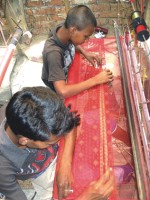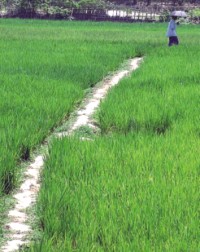| Perceptions
A Day in the Country
Andrew Morris
 |
Jamdani weavers at work |
I'd first met Russel at a friend's house one evening. He had a handsome, open face, and a gift for speaking with almost unnerving frankness and sincerity. I'd been playing some music, and he had apparently decided immediately that we would be friends. He took from his wallet a fresh two taka note. As these would soon be disappearing off the streets, he said, he wanted to give me one in token of our bond, and solemnly pressed it into my hand. I have it here on my desk, this strange gift of friendship.
It turned out as we talked that Russel was a weaver, part of a community of Jamdani weavers which has existed in the Rupshi area just outside Dhaka for over 2500 years, with sari-making skills being handed down from generation to generation. When offered the opportunity to pay a visit to his village, I jumped at the chance.
We were to set off at 8am to avoid the gathering heat. Leaving the house that morning, I decided to walk over to my friends' place, twenty minutes away. Yes, I know, quite an extraordinary thing to do in Dhaka, but it was a morning where the air was light and balmy, the colours fresh in the silent gardens.
Walking amongst the morning strollers, the maids, the retired colonels, the garments workers, I had one of those epiphanic moments. The ground of Bangladesh cushioned my feet: I sensed its firmness, its solidity, its curve upon the earth, and it felt good. Then, while turning a corner I bumped into a maid who used to work for me many years ago, and what joy there was in that sudden warm conversation, that chance encounter in the dewy sunlight. We eventually said goodbye and walked on into our different worlds.
 |
|
The green fields of Rupshi |
A slight change of pace as my friends and I climbed into their car after a delicious breakfast of parathas and vegetables. For this was no ordinary vehicle: it was more of a spaceship: sleek, ergonomically shapely, with doors which slid open soundlessly. I gaped like a boy from a tiny village up in the city for the first time. There was a panel on the dashboard covered in Japanese characters, which at the driver's light touch turned into a TV screen showing the front and back of the car. Oh I do like toys like that: I must get one fitted to my rickshaw.
We began to speed through the city. Is it my imagination or has the traffic been more than halved by the flight of certain persons seeking to evade the long arm of the law? If so, long may they stay overseas -- this place has become almost pleasant to drive through. Almost. We reached our destination in under an hour.
Spilling out of our capsule into the village the first thing that struck me was the lush emerald of the paddy. The huts nestling around the rickety fences, the play of shadow as the sun began to flex its muscles. And all around there were children whooping, playing cricket, looking shyly from their rooms, intrigued by and a little nervous of this foreigner. But despite initial appearances this was no typical village: dominated as it is by the weaving trade. There were rooms with heavy power looms shunting back and forth, with all the clanking and cacophony of a busy printing press. There were sticks in the ground around which fine threads were being spun, shining like cobwebs in the bright light. And then there were the cottage factories where workers sat on the ground, working on saris of brilliant scarlet and kingfisher blue, stitch by stitch. One of these exquisite saris can take up to six months to make, and then sell for up to fifty thousand taka. Looking around though, something told me that only a small percentage of this reaches the workers themselves. Doubtless there is some well-padded middleman somewhere in the city patting his wallet as I write.
 |
Nazmuni |
The weavers have had a sometimes troubled history, and never more so than under the British. Alarmed by the high level of craftsmanship among these artisans, busily developing their fine muslins and silks, my forefathers in the eighteenth century saw huge competition and a threat to the incipient textile industries of Northern England. Their response? To come out to villages like this and cut the workers' thumbs off. Simple, huh? The trade died out overnight and took decades to restore.
Now the little looms are busy once again, and the detail of the work is amazing. The hands of the weavers fly back and fore in practised movements. Already those who are teenagers are expert: they start young here. I was adopted for the morning by a pretty 8-year old guide called Nazmuni, who took me by the hand as we walked around. She herself works from 6am till 9pm, and doesn't know how to read or write. I encouraged her to go to the school, (there is one in the village) but doubt whether she was convinced: tradition is a weighty thing. Still, you never know whether yours might be the words that make a difference.
At one point we lost sight of our friends who had disappeared into one of the huts. Standing there next to the wide sun-sparkled river, with boats bobbing in the muddy water, children swimming and housewives washing their clothes, Nazmuni turned to me earnestly and said “If they forget you and leave you behind, will you have to stay here for ever?” I smiled. I could think of worse places to be abandoned…
We returned to Russel's house and went through the by now familiar hospitality ritual: eating at a Bangladeshi village house sometimes seems like a battle of wills. It's the host's sense of obligation up against your desires: the person who blinks first loses. Russel offered trays of sweets, tea, coconut, yoghurt straight from the cow out in the hot yard, rice cakes, fresh juice. We protested and refused. He kept on bringing more and in the end, worn down, we ate and enjoyed.
I took my sax outside and played for the kids. They seemed intrigued by this thing which appeared to be a golden flute, but with lots more buttons and knobs on. I'm not sure what they made of the sound. It's tempting to indulge in universalist reveries about how music speaks to all of us at a subliminal level, but if I'm honest I think they found it all a bit weird. Only when a loud youth with a tupi and slightly staring eyes came along and sang a shouting village song did they seem to sit up and start enjoying themselves. I can see I have some way to go before setting up a gig here.
After yet more snacks and treats, we finally climbed into our luxurious cabin and set off for the city once again. And so the verdict on the day? On the one hand I'd witnessed child labour, historical tragedy, and village life with all its deprivations. Yet on the other hand, I realised that from the early morning walk, to my saunter through the village hand in hand with Nazmuni, to the genuine openness and welcome showed by the villagers, this was another one of those special days on which I had felt very close to this place and its people.
A day, in fact, in which a little voice at the back of my mind began softly to whisper that perhaps, just perhaps, I would never leave.
Photos: Andrew Morris
Copyright
(R) thedailystar.net 2007 |
|
